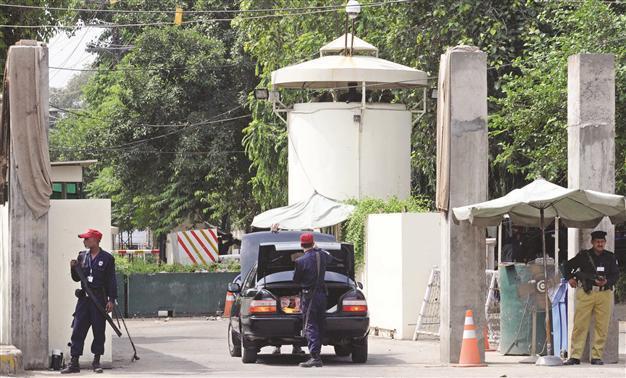Al-Qaeda alert brings new operations by US
LAHORE / SANAA

Pakistani security personnel stand alert outside the US consulate in Lahore. The United States has evacuated all non-emergency staff from its consulate.
The United States has sharply escalated its drone war in Yemen, stepping up strikes against suspected militants amid a global security alert, with military officials in the Arab country reporting 34 suspected al-Qaeda members killed in less than two weeks, including three strikes on Aug. 8 alone in which a dozen were killed.
The action against al-Qaeda in the Arabian Peninsula (AQAP), as the Yemen branch is known, comes amid a global terror alert issued by Washington. One Mideast official said the uptick is due to its leaders leaving themselves more vulnerable by moving from their normal hideouts toward areas where they could carry out attacks. All the airstrikes targeted cars, a security official said, who spoke on condition of anonymity. The drone strikes have become a near-daily routine since they began July 27. So far, they have been concentrated in remote, mountainous areas where al-Qaeda’s top five leaders are believed to have taken refuge.
While the U.S. acknowledges its drone program in Yemen, it does not talk about individual strikes or release information on how many are carried out. The program is run by the Pentagon’s Joint Special Operations Command and the CIA, with the military flying its drones out of Djibouti, and the CIA out of a base in Saudi Arabia.
The U.S. and Britain evacuated diplomatic staff from the capital of Sanaa this week after learning of a threatened attack that prompted Washington to close temporarily 19 diplomatic posts in the Middle East and Africa. A U.S. intelligence official and a Mideast diplomat have told the Associated Press that the embassy closures were triggered by the interception of a secret message between al-Qaeda chief Ayman al-Zawahri and Nasser al-Wahishi, the leader of the Yemen-based offshoot, about plans for a major attack.
Pakistan hit by attack
Meanwhile, Washington evacuated all non-emergency staff from its consulate in the Pakistani city of Lahore, citing “specific threats.” A spokesman for the U.S. embassy in Islamabad said the evacuation of all non-essential staff there was not linked to the alert that prompted the closure of embassies and consulates in the Middle East and Africa. The move came as Pakistan’s troubled southwestern city of Quetta, focus of a surge in sectarian bloodshed, was hit by its second attack in two days as gunmen shot dead at least nine people outside a mosque on Aug. 9.
And a suicide bomber killed 38 people at a police funeral in the city on Aug. 8. Yemen’s northern neighbor Saudi Arabia, meanwhile, said it has arrested two suspected al-Qaeda members who may have been plotting against Western diplomatic missions in the Middle East.
The two, a Yemeni and a Chadian, had contacts with AQAP, state news agency SPA reported. AQAP, formed in January 2009 in a merger of the Yemeni and Saudi branches of al-Qaeda, is viewed by Washington as the most active branch of the worldwide jihadist network.
